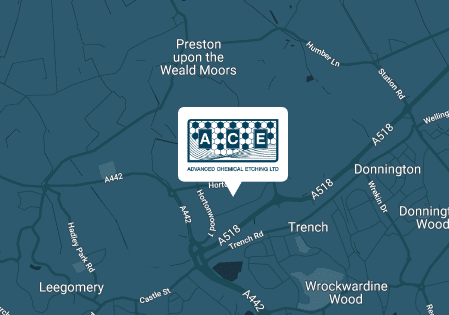TITANIUM
ETCHING
What Is Titanium Etching?
Unique Titanium Etching Process
ACE has developed a new, unique, safer titanium etching process that takes chemical etching titanium to new levels of quality and precision. This is still one of the only safer etchants for use with titanium and is unique to ACE. Learn more about our TiME titanium etching technique.
All Metal Grades
ACE’s titanium etching process can produce complex features and geometries in titanium sheets of all grades, including titanium (Alpha) grades 1-4, titanium (beta) grades 5-38, Nitinol and Kapton Coated Titanium. Our titanium etching process does not affect the chemical and mechanical properties of the metal.
Processing Speed at Production Scale
ACE has vastly increased the processing speeds and rate of chemical etching titanium. Our titanium etching process has a higher etching capacity, and we are one of the few chemical etching companies in the world that can offer titanium etching on a production scale.
Huge Range of Applications
The Titanium etching process has a huge range of applications in a variety of industries, especially in the medical sectors where there is a demand for lightweight etched titanium components used in implants and medical devices such as pacemakers. Find out more about titanium chemical etching for medical devices.
Discover Titanium Etching Solutions from ACE
Benefits Of The Titanium Etching Process
While the conventional, industry standard process of titanium etching can endure several serious drawbacks that make the process unreliable for large volume production. ACE’s development of the TiME titanium etching technique, enables them to overcome this problem:
Some of the benefits of our unique titanium etching process include:
- Smooth edge profile and smooth surface etch profile
- No surface burrs
- Tight tolerances possible ±10% of material thickness
- Complex geometries at no extra cost
- 1:1 aperture aspect ratio possible
- Thicknesses from 0.010mm – 1.00mm
- Part size up to 280mm x 480mm
- Fast turnaround
- Serial production capacity
- No heat-affected zones
- Safer chemistry reduces personal and environmental risks
DISCOVER ACE’s TITANIUM ETCHING PROCESS
Worth knowing…
Traditionally, Hydrofluoric Acid (HF) has been used as the preferred etchant for chemical etching titanium, because of its ability to remove the titanium oxide layer. However, HF is a highly dangerous chemical and one we will not use! We use a unique, non-HF chemistry developed at our laboratory in the heart of the West Midlands. Find out more about the chemistry of metal etching.

